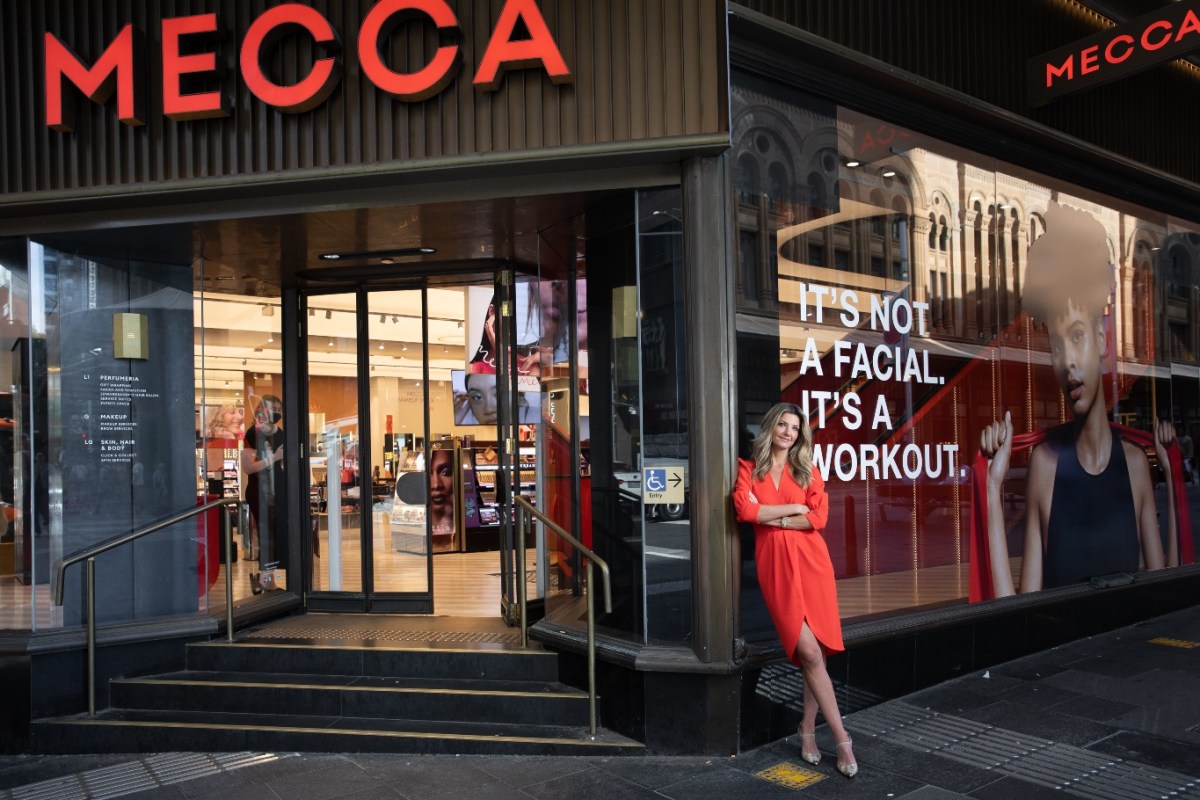It wasn’t long ago that consumers were wearing face masks and avoiding beauty treatments, too scared to get their nails or hair done. Fast forward a couple of years, and at Mecca, skincare junkies are now back in stores, getting their cheeks rigorously pulled and pummelled using techniques and products from LA cult brand, Face Gym.
Never heard of it? Face Gym is an intense workout for the skin, using high-energy facial massage techniques like whipping, kneading and knuckling and cutting edge technology to tone and tighten.
“We launched Face Gym at our Sydney flagship earlier this year and the customer response has surpassed all expectations. We are already looking to expand the offer to meet demand and we would love to see more Face Gym locations in more Mecca flagships in the future,” says Maria Tsaousis, Mecca’s head of new concepts and services.
“Since Covid, we have found our customers are craving more physical touchpoints, contact with experts and great experiences.”
In addition to Face Gym, Mecca has recently unveiled Mecca Aesthetica at Highpoint in Melbourne, focusing solely on tech-led services carried out by qualified dermal therapists. In-store, the beauty giant has also launched Skinspaces, dedicated areas where customers can enjoy skin consultations and express skin services.
“Our skin services at Mecca are centered around what our customers want – access to knowledgeable and friendly experts, treatments that deliver results and the convenience of being able to get great service, high performance treatments and the very best in brands and products all in one place,” Tsaousis explains.
The strategy behind the success of Mecca’s services lies in offering a personalised experience for consumers through customisable skin treatments. New diagnostic tools capture high-resolution images that help customers understand their skin concerns and create personalised treatment and product regimes.
The skincare category shows no signs of slowing down and by 2025, it’s estimated that the global skincare market will be US$189.3 billion.
According to global consulting firm McKinsey, some of the biggest trends in the post-pandemic beauty industry lie in the growth in brands offering both products and services’, consumers’ preferences for specialised experiences, and the increased centrality of customer experiences.
Executed well, services can lead to deeper customer relationships and increased in-store foot traffic, but according to McKinsey, “they will need to develop a clear strategic objective, build a unique customer experience, and carefully consider their capital expenditure requirements”.
“Recent upheavals and ongoing technological innovations are leading to innovative offerings in both products and services across the industry,” it said in an article.
“Companies that are slow to develop a robust services strategy that adapts to and capitalises on this new battleground are at risk of falling behind.”

Making facials accessible to all
Meanwhile, savvy entrepreneurs are tapping into new opportunities in the services space, like friends and industry experts Katelin Gregg and Ella James, who launched Fayshell in December, a subscription-based skincare clinic based in Bondi Junction, Sydney.
“When visiting a skin clinic, the treatment menus are often too overwhelming, expensive and time-consuming,” says Fayshell co-owner, Ella James.
“This was the inspo behind our brand. We want to bring facials to the every day, educating our clients about their skincare needs and offering a customised experience, to ensure they put their best face forward.”
There are four tiers of membership at Fayshell, from the first-time customers who receive a skin analysis, consultation and skin plan, to the ultimate package, including skin needling, chemical peels, hydrabrasion, herbal peels, unlimited LED treatments and more.
Fayshell attracts two types of key customers, explains James. The first are skincare fanatics who already have treatments but Fayshell provides them with cost savings, the convenience of having access to an LED bar, as well as other membership perks.
The second type of customers are those at the beginning of their skincare treatment journey and have no idea where to start. For them, the membership-based service is somewhere that they can show up regularly and be accountable, but with the help of a skincare expert to lead the way.
According to Gregg, consumers’ views of services are also evolving. Rather than focusing on injectables and using filler, they are now looking to skin treatments to improve skin laxity and volume. Many are also recognising the importance of starting an appropriate skincare regime and treatments at a younger age in an effort to get ahead of the ageing process.
“Another key thing we’ve noticed is that people are wearing less and less makeup. Skin is at the forefront of beauty at the moment and it’s kind of that dewy, clear healthy complexion that is really being portrayed as beautiful,” Gregg says.
Following on from consumers’ desire for personalised services, Fayshell’s services are also customisable and guests are guided by a skin expert who understands their concerns and goals and can tailor a complete treatment especially for them.
“When we did our market research, over 50 per cent of people only found the time to have a facial when they received a gift certificate. We’re trying to really shift the perception that facials are an indulgent luxury and help people understand the benefits of proactively looking after their skin,” says James. “We want to create a facial salon that you can visit with the in-and-out position of a nail salon…Facials shouldn’t be reserved for a big event or luxury spa.
Jo-Anne Hui-Miller is Content and Insights Director at retail strategy and innovation agency, The General Store.
This article was first published in the Winter issue of Retail Beauty:
- For more news and updates, subscribe to our weekly newsletter
- Follow us on Instagram
- Like us on Facebook

